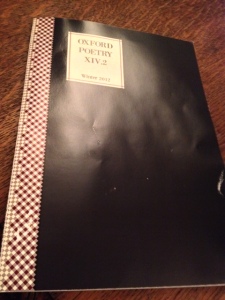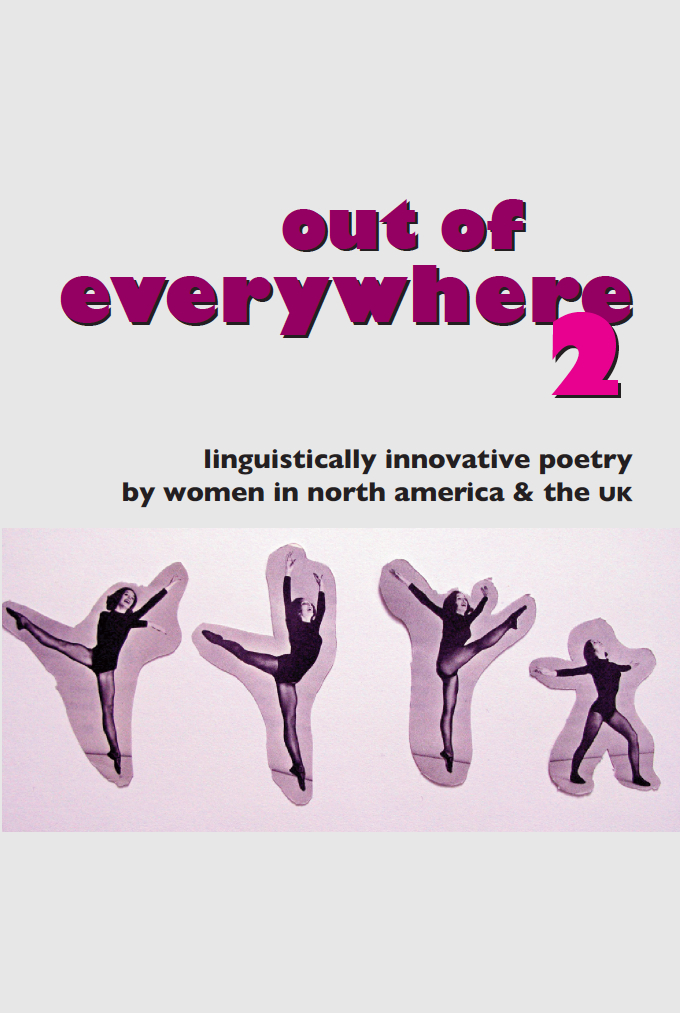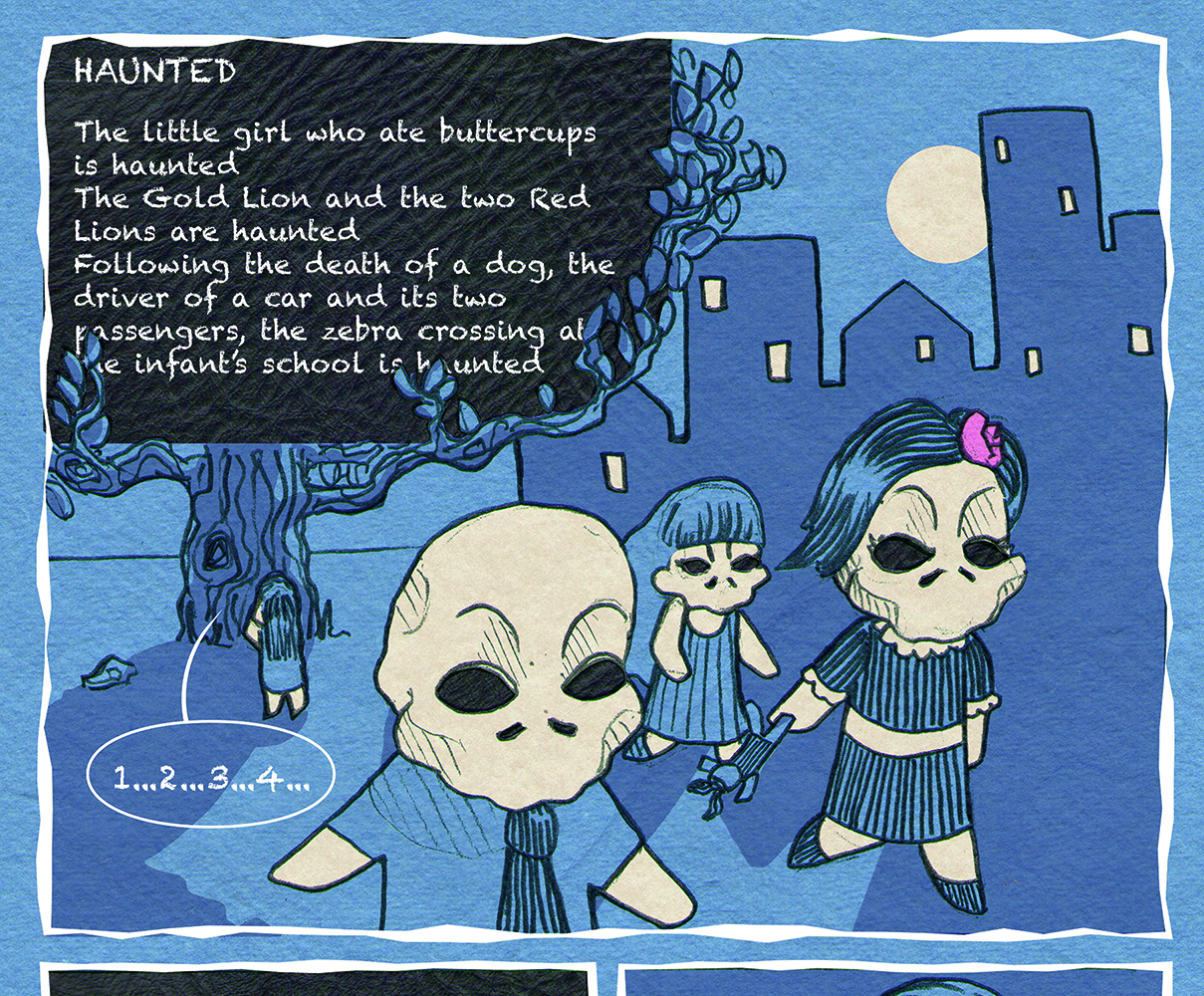Oxford Poetry XIV.2 (Winter 2012)
-Reviewed by Claire Trévien–
It’s a compliment to say that Oxford Poetry, one of the oldest poetry magazines of its kind (113 years old to be precise), does not look its age. The cover may be quietly unassuming, in a vintage picnic basket kind of way, but the list of contributors reads like a who’s who of the Next Big Thing (with some exceptions, such as Fiona Sampson who, we can agree, is no longer emerging). Just like a previous generation of poets centred around the workshops of Michael Donaghy, many of these are regulars at Roddy Lumsden’s Poetry School workshop.
This leads naturally to another compliment, that in spite of there being a sense that this grouping of poets are all part of the same ‘pack’, there is no uniformity of voice. No one could accuse Sophie Mayer and Matthew Hollis’ poems of being too similar in tone, form, or subject. Nevertheless, some themes do emerge, reflecting the tastes of editors Lavinia Singer and Aime Williams, for storytelling and still lives. Still lives here is meant as freeze-framing of a particular time, as epitomized by Daniel W.K. Lee’s ‘The Way we Wore Young’ whose snapshot of 1995 America erects cultural and time barriers, pelting information like a Windows screensaver from which a killer last line emerges. On the storytelling side, Emily Hasler’s poem ‘What Gretel Knows’ is a stand-out, a delightfully dark take on the Hansel and Gretel fairytale, set out in long barbed lines:
‘Gretel knows, put a girl in water and she’ll drown; boil it;
and she’ll cook. Gretel knows there’s no salvation; only storage,’
Each line powers forward scattering on the way clashing registers: part dark incantation, part childish glee, part sweary delicious humour. It’s an exhilarating trip, relying on our pre-knowledge of the tale to transform it into a larger meditation on these archetypal characters all ‘obsessed with our stomachs’.
Not all poems are exceptional, a number try to deal with historical or fictitious events but struggle to bring added interest to the table. For instance, Ben Parker and Alex Niven’s reports from unknown places feel insubstantial, though the latter has turns of phrase that add colour to the depictions: ‘Warriors were / expunged from the phonebook’ and ‘Friends withered and sank’, he writes. Parker’s ‘From the Histories I’ would have perhaps benefited from being partnered with his more intriguing poem ‘From the Histories II’ (also from his pamphlet, reviewed here by James Webster), which reveals the limitations of Oxford Poetry‘s current one poem format. As a standalone, however, there is little of interest in the language though the premise shows promise:
‘Conflicting reports were delivered daily
from the city of high walls and no gates.
The crops were flourishing even
as the wells came up dry.’
Also disappointing is Fiona Sampson’s ‘The Night-Drive’, a poem which doesn’t add anything to its title save for the blossom which hangs ‘hallucinatory / in darkness, beside the road’. Perhaps most frustrating with these poems is that there is no active ‘flaw’ within them, but they are unsatisfyingly straightforward descriptive poems lacking in intent or purpose.
Thankfully, there is no lack of exciting poetry elsewhere in this journal which more than makes up for this. Indeed, there are more standout poems than can fit in this review, such as Sophie Mayer’s intoxicating flight of fancy ‘The Mayer’, or Dai George’s ‘My Peace, the Ornament’, which begins with a delightfully playful description of the invasion of noise into his flat from ‘the witless bus and incontinent van /unloading on the kerb’ before ziplining the reader, along with the narrator ‘to days when childhood’s brain / was a rammed junction.’ Other favourites include a creative translation by Sophie Collins of Astrid Lampe, and Caleb Klaces’ ‘An Agreement’, whose elastic mixture of theatrics, birds and claustrophobia is set playfully on the page making the eyes leap from line to line.
Meanwhile Phillip Crymble shows what it means to take a risk; his poem ‘Brogue’ flirts with disaster with its bordering-on-cliché definitions. Taken individually its sentences feel frustratingly predictable, but they build up into an intriguing exploration of language and identity for today’s third culture kid:
‘All over. Meaning lost or gone. A local idiom that speaks
of disappointment. When asked it’s here I say I’m from.
All over. Meaning don’t belong. An orphan with no mother
tongue. The aspirated consonants of Ulster. Low-mouthed
vowel sounds. A confederacy of opposites.’
Where Crymble plays on simple expressions to create a complex tableau, John Canfield’s ‘Amortisation’ prefers to borrow from the ‘”Jargon Buster’ of a commercial property developer’ to create a humourously obscure take on a relationship:
‘Real trust exempts participants both
from growth and service. The exchange is total
return earned over a specific period
and often expressed at the beginning of the year.
Turnover. Yield.’
By turns conservative and experimental, modern and old-fashioned, this issue of Oxford Poetry is designed to please everyone, which won’t be to the taste of everyone, but who are we to point fingers at an institution for having democratic tastes?




